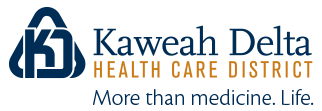
Did you know Cancer is the second leading cause of death in the U.S.? Hi this is Jody Jo.
 Cancer is a scary thing to hear from your Doctor. The FLOOD of questions-normal. Every living person can probably identify someone they know who has or who has had cancer in their lifetime. The four most common cancers are Breast, Prostate, Lung and Colorectal Cancer.
Cancer is a scary thing to hear from your Doctor. The FLOOD of questions-normal. Every living person can probably identify someone they know who has or who has had cancer in their lifetime. The four most common cancers are Breast, Prostate, Lung and Colorectal Cancer.
The good news is that screenings exist for these common cancers. Screenings save lives. Talk to your doctor and schedule your screening today, particularly if you are at risk of cancer. Adopting a Healthy Lifestyle can also help prevent cancer.
To learn more about cancer, go to KaweahDelta.org
SPONSORED BY:
SCREEN TO SAVE
Screen to Save (Common Cancers and how screening can save your life)
Cancer is a group of diseases characterized by the uncontrolled growth and spread of abnormal cells. If the spread is not controlled, it can result in death. Cancer is the second leading cause of death in the U.S. About 1.7 million new cancer cases are expected to be diagnosed in 2018. Every living person can probably identify someone they know who has or who has had cancer in their lifetime.
The four most common cancers are Breast, Prostate, Lung and Colorectal Cancer. For every cancer, the key for survival lies in early detection. The good news is that screenings exist for these common cancers.
 Breast Cancer
Breast Cancer
• Conduct monthly self-breast exams starting at age 20
• Have a clinical exams by your physician, every 1 – 3 years under age 20 and every year starting at age 40
• Schedule an annual mammograms starting at age 40
• Ask your doctor about an ultrasound if you at a higher risk (family history of breast cancer)
 Lung Cancer
Lung Cancer
• Screening for lung cancer is not yet a standard and many cases are caught very late. Monitor your symptoms and talk to a doctor if you experience unexpected shortness of breath, coughing or wheezing, coughing up blood or sputum, chest pain or are feeling tired or weak.
• A new tool has been recently been developed as a high risk screening tool through a low dose CT scan. Talk to your doctor if you are at a higher risk.
 Colorectal Cancer
Colorectal Cancer
• Schedule a colonoscopy, starting at age 50 (earlier if you are at a higher risk).
• Colonoscopies should be conducted every 10 years if you don’t have risk factors, every 5-10 years if you have risk factors or if any adenomas are present in your initial scan.
Prostate Cancer
• Clinical exams (PSA and DRE exams) by your physician starting at age 50 (earlier if you are at a higher risk)
Screenings save lives. Talk to your doctor and schedule your screenings, particularly if you are at risk for cancer.
Though age and genetics are a factor in whether or not a person will get cancer, a substantial proportion of cancers could be prevented. Adopting the following healthy habits can help prevent cancer:
• Don’t smoke or chew
• Limit alcohol consumption
• Healthy Diet
• Exercise Regularly / Maintain a Healthy Weight
• Protect Skin from UV Rays
• Annual checkups / Screen early
HELPFUL RESOURCES






